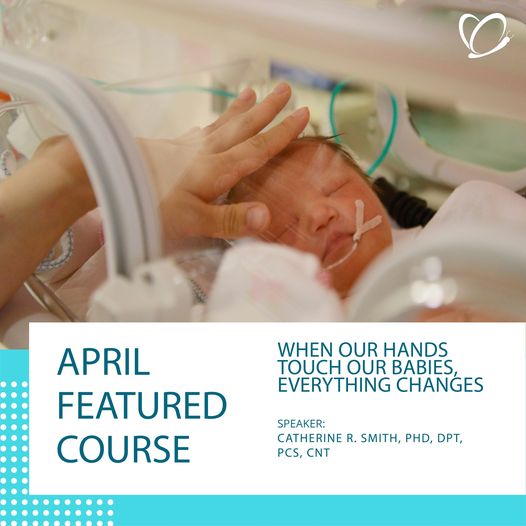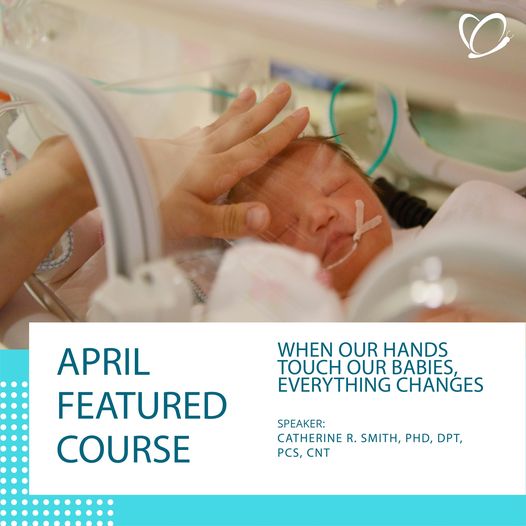“Not only did Dr. Smith provide current scientific basis for how we touch infants, but this talk reinforced the need for an understanding of movement analysis as the underpinnings of handling.” – Robin P. Glass, MS, OTR, IBCLC
Topic: When Our Hands Touch Our Babies, Everything Changes

Course Description: This course will review general guidelines to consider when developing and applying handling interventions in the Neonatal Intensive Care Unit. The benefits of using manual contacts to support neuromotor development in preterm infants will be discussed, and the potential negative effects of applying incorrect augmented facilitation techniques will be reviewed.
Speaker Bio: Catherine R. Smith, PT, DPT, PhD, PCS, CNT, holds the Doctor of Physical Therapy and PhD in Human Ecology. She currently serves as Professor Emeritus and Adjunct Faculty in the Department of Physical Therapy at the University of Tennessee at Chattanooga. She is an ABPTS Board Certified Pediatric Clinical Specialist in Physical Therapy (recertified, 2013), and is an NTNCB Board Certified Neonatal Therapist (certified, 2017). She is also a certified BNBAS, NIDCAP and GM examiner. Dr. Smith has been an invited speaker for over 60 educational sessions at professional meetings and continuing education courses at the national, state and regional level in the United States, with 33 of the presentations having been also disseminated electronically as multimedia continuing education courses specifically addressing different aspects of developmental care in the Neonatal Intensive Care Unit. She has provided guest lectures, workshops and seminars internationally in 9 European universities in the Czech Republic, Lithuania, Slovakia, Spain, Romania and Bosnia as well as having observed and participated in direct clinical services internationally in central and western Europe and the Caribbean.
Dr. Smith served on the APTA Pediatric Academy Task Force to develop and publish the 1999 NICU Competencies for physical therapists working in the NICU setting. She is a member of the National Association of Neonatal Therapists (NANT) Professional Collaborative to develop core scope of practice and core competency document for therapists representing PT, OT and SLP providing services in the NICU practice setting. Recent publication includes: Craig JW, Smith CR. Risk adjusted / neuroprotective care services in the NICU: The elemental role of the neonatal therapist (OT, PT, SLP). J Perinatol (2020) 40:549–559 https://doi.org/10.1038/s41372-020-0597-1
Dr. Smith has served as mentor for professionals from multiple disciplines for practice in the NICU and early intervention follow up services for NICU graduates through formal and informal teaching for over 30 years (including professionals from PT, OT, Speech, Nursing, Medical Residents, Neonatal Nurse Practitioners, Respiratory Therapy and early intervention educators). She has served on multiple advisory boards and provided consulting support at the local, regional, national and international level, and she was recently awarded the prestigious Humanitarian of the Year (2020) award by the American Physical Therapy Association. Additionally, she received the National Association of Neonatal Therapists NICU Pioneer Award (2015) and the TPTA Physical Therapy Educator of the Year (2015).
Target Audience: OT, SLP, PT and neonatal professionals
Educational Level: Advanced
CE Credit: OT, SLP, PT – 1.5 hours
Fee: $57 or Free for NANT Members
Objectives:
- Define the influence of augmented input to the central nervous system (CNS) via manual contacts on biomechanical, neuromuscular and sensorimotor systems of preterm infants
- List the factors that influence decisions regarding when, where, how and why to augment input to the CNS via manual contacts
- Select manual dynamic support techniques that enhance self-regulatory motor responses, reduce stress reactivity and support resilience in low-threshold preterm infants
Instructional Methods: Recorded webinar, lecture, PowerPoint handouts, and recorded question and answer session. Learning assessment and course evaluation follow course.
Click here to access the course.
“Dr. Smith’s lectures are always my favorite. The science of what we do is fascinating, and I love hearing that story told so beautifully and with language that we can carry into our communication with providers and colleagues in our units. I feel like I get about 50% smarter every time I hear Dr. Smith talk.” – Katherine Long, PT, C/NDT, CNT

